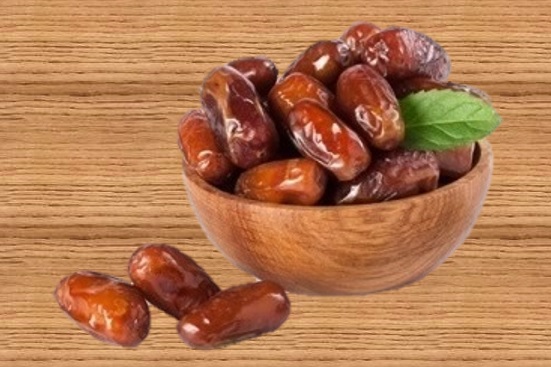
Benefits of Dates
Dates have multiple benefits as they are sweet, fleshy, delicious in taste, and also nutritious with high quantities of minerals and fiber. This palm fruit is also calorie-dense and high in carbohydrates.
Calories in Dates
A 3.5-ounce serving of pitted dates, or 14 dates, provides about 282 calories, 2.5 grams of protein, less than half a gram of fat, and 75 grams of carbohydrates, of which nearly 63.4 grams are the simple sugars sucrose, fructose, and glucose. Per 3.5-ounce serving, or about 4 pitted dates, the larger, meatier semi-soft date supplies 277 calories, 1.8 grams of protein, very little fat, and 75 grams of carbohydrates, of which 66.5 grams are mostly the simple sugars glucose and fructose.
Dietary Fiber in Dates
Dates are an excellent source of dietary fiber. A single date contains over half a gram of fiber, while a 3.5-ounce serving of these dates provides 8 grams of fiber. The larger size date supplies 1.6 grams of fiber per date, or 6.7 grams of fiber per 3.5-ounce serving. Dates are especially high in a special kind of soluble fiber known as beta-D-glucan, according to the “Encyclopedia of Healing Foods.” This type of soluble fiber is particularly beneficial, as it promotes normal blood glucose levels, blocks the absorption of cholesterol, and increases the size of stools. Beta-D-glucan also slows digestion in the stomach, thereby contributing to long-term satiety.
Nutritional Value of Dates
Dates are high in nutritional value containing several important minerals including potassium, manganese, magnesium, and copper. They also provide significant amounts of calcium, iron, vitamin K, and B vitamins, including vitamin B-6 and folate. A 3.5-ounce serving of pitted dates supplies 19 percent and 11 percent of the daily values for potassium and magnesium, respectively, as well as 8 percent, 6 percent, 5 percent, and 4 percent of the daily values for vitamin B-6, iron, folate, and calcium, respectively. Although dates are nutritionally comparable, they’re slightly higher in potassium, magnesium, vitamin B-6, and calcium, and slightly lower in iron and folate. Dates are also a rich source of phenols and antioxidant compounds that protect cells against damaging free radicals.
Fresh Dates Vs Dry Dates
Although fresh dates may be slightly wrinkled and similar in appearance to dried dates, fresh dates are typically sold alongside other fresh fruits, while dried dates are pasteurized and sold in boxes or bulk bins. U.S. Department of Agriculture food group guidelines don’t give specific intake recommendations for fresh dates, which are significantly higher in sugar and calories than most fresh fruits. Given their distinct nutritional value, however, individual servings of fresh dates should generally be kept to 1/2 cup or less. Dried dates are nutritionally comparable to other dried fruits. Accordingly, a 1/4 cup of dried dates counts as 1/2 cup of fruit in daily intake terms. Most moderately active adults should consume 1 1/2 to 2 cups of fruit per day, according to the USDA.
Frequently Asked Questions (FAQs) About Dates
How many dates should I eat a day?
Eating a handful of fresh dates in a day can satisfy your sweet tooth. Dates are an instant source of boosting energy in the human body.
What are the benefits of eating dates?
There are many benefits of eating dates as they are rich in fiber and potassium, aiding digestion and providing energy. They can enhance the taste and texture of both sweet and savory dishes.
